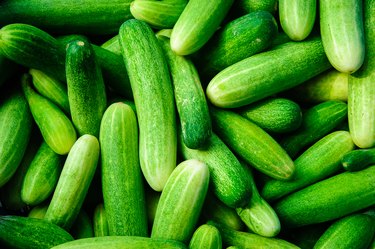
Some people with gastritis claim cucumbers are a miracle food for relieving symptoms of the condition. Others say cucumbers trigger painful symptoms. The verdict from health care experts is mixed. But if you're a fan of this popular veggie, here's what you need to know.
Read more: Foods to Avoid for Gastritis
Video of the Day
Video of the Day
Gastritis and Your Diet
What you eat doesn't cause gastritis, says the National Institute of Diabetes and Digestive and Kidney Diseases (NIDDK). But certain substances and foods can irritate the lining of your stomach lining and cause symptoms of gastritis to flare up, says Johns Hopkins Medicine.
Understanding which foods trigger gastritis symptoms is one of the first steps in preventing potential discomfort or pain. Some people with gastritis have no symptoms, but others may experience upper abdominal pain, nausea, vomiting, acid reflux, feeling uncomfortably full after eating or a loss of appetite.
Hardeep M. Singh, MD, a gastroenterologist with St. Joseph Hospital in Orange, California, explains that spicy foods, caffeine, alcohol and foods that are naturally acidic can be irritants that trigger discomfort or pain associated with gastritis flares. (These symptoms can be worse if you also have food allergies.)
Treating Gastritis Symptoms
Treatment for gastritis depends on what's causing it, says Mayo Clinic. Taking an an over-the-counter antacid or proton pump inhibitor (PPI) can reduce the production of acid to alleviate symptoms and help heal your digestive tract.
However, long-term use of PPIs, especially at higher doses, poses a risk of certain bone fractures and other side effects, according to a February 2018 review in Mayo Clinic Proceedings. Although these drugs can work well initially, using the medications long-term can have side effects. Some of the drugs also may become less effective over time.
Besides using medication to relieve symptoms, avoiding trigger foods is another approach for finding relief, Mayo Clinic says. You may also want to consider trying different foods that may act as natural antacids.
Natural Foods for Gastritis Relief
According to an October 2017 comparative study published in Complementary Therapies in Medicine, cucumbers (among other natural foods) showed "significant antacid activity." In the study, researchers used an artificial stomach model to test and measure how well samples of various natural foods neutralized artificial stomach acid, as compared with water, sodium bicarbonate and a common antacid.
They noted that the high water content of cucumbers helps with acid reflux by raising the stomach's pH balance and essentially rinsing out the stomach acid that flowed back up into the esophagus. Cucumbers also help to flush toxins out of the body, which is beneficial for people with gastritis because toxic substances can also trigger symptoms of gastritis.
If cucumbers aren't your thing, or if you want more options, the study also found that other vegetables — including broccoli, radishes and kale — offer similar benefits of helping to alleviate gastritis symptoms. Each of these foods showed a greater acid neutralizing effect than water.
Not only that, but these foods also reduced acid reflux, reduced burning associated with excess acid secretion and soothed inflammation in the stomach for a longer length of time than water. Broccoli was the highest ranked vegetable for antacid activity, offering relief similar to that from sodium bicarbonate and the standard antacid.
The Bottom Line
Always listen to your body and respond accordingly. Maybe for some people cucumbers can act as a natural antacid to relieve gastritis symptoms, but if you know that cucumbers trigger your symptoms, don't eat them, regardless of what you may have heard from someone else.
It's also important to note that severe gastritis can lead to ulcers, or erosions in the stomach lining that bleed, reports the NIDDK. If that's the case, you may notice such symptoms as blood in your vomit (especially if it looks like coffee grounds), black or tar-like stools, or blood in your stool.
Severe gastritis can also leave you feeling fatigued, short of breath or lightheaded. If you ever have any of these symptoms, call your doctor right away.
Read more: Are Probiotics Good for Gastritis?
- Hardeep Singh, MD, gastroenterologist, St. Joseph Hospital, Orange, California
- National Institute of Diabetes and Digestive and Kidney Diseases: "Symptoms & Causes of Gastritis & Gastropathy"
- Complementary Therapies in Medicine. "A Comparative Study of the Antacid Effect of Some Commonly Consumed Foods for Hyperacidity in an Artificial Stomach Model"
- Johns Hopkins Medicine: "Gastritis"
- Mayo Clinic: "Gastritis - Diagnosis and Treatment"
- Mayo Clinic Proceedings: "Proton Pump Inhibitors: Review of Emerging Concerns"
Is this an emergency? If you are experiencing serious medical symptoms, please see the National Library of Medicine’s list of signs you need emergency medical attention or call 911.